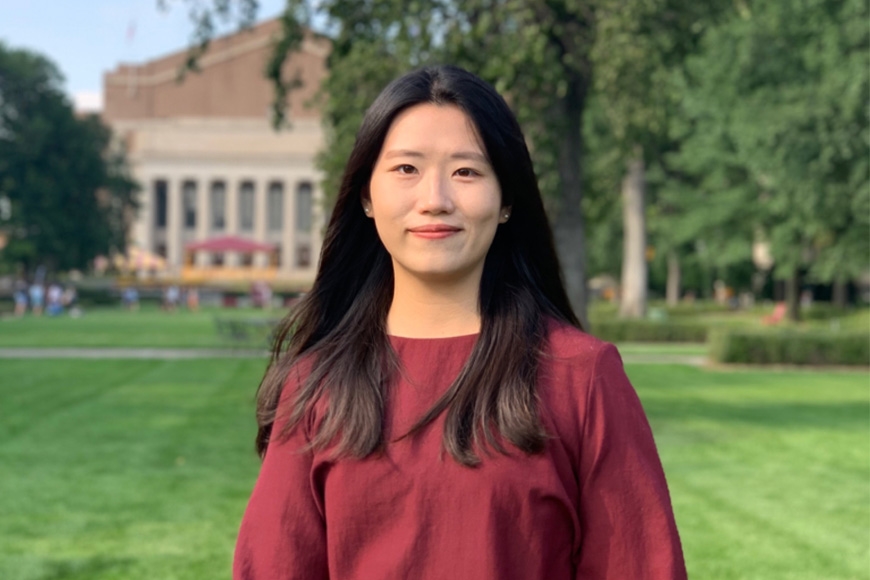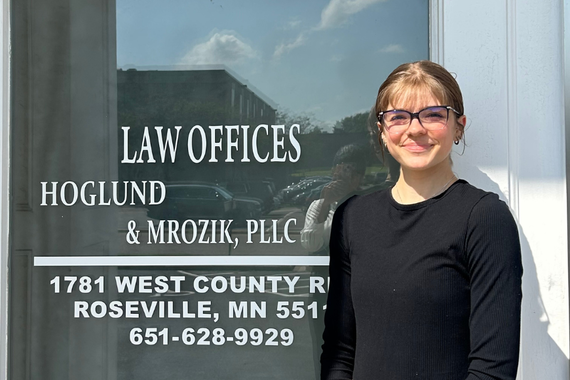Yoonsoo Kim Researches How Cities Confront the Climate Crisis
Media coverage of climate governance often focuses on negotiations between countries, like The Paris Agreement, or national policies, like The Green New Deal. However, as political science PhD candidate Yoonsoo Kim argues, cities are at the forefront of confronting these issues. Kim discusses why she chose to study at the University of Minnesota, how she has felt supported as an international student, and what she hopes to achieve through her research.
What do you study and how did you become interested in it?
During my undergraduate studies, I had the opportunity to take a course on human rights and international law. This experience profoundly impacted me, igniting a deep passion for the subject. The intricate balance between legal frameworks and the protection of human rights fascinated me, revealing the critical role that international law plays in ensuring justice and equality on a global scale.
As I delved deeper into the course material, I realized that this was not just an academic interest but a field I wanted to dedicate my career to. The complexity of the issues, the importance of advocacy, and the potential for meaningful change resonated with me on a personal level. Motivated by this newfound passion, I made the decision to pursue a doctoral degree in this field. I was eager to contribute to the development and implementation of policies that protect human rights and promote social justice worldwide.
What brought you to the University of Minnesota?
My master’s degree advisor, who earned his PhD from the University of Minnesota, had a profound influence on my academic and professional aspirations. His mentorship and the insights he shared about his experiences significantly shaped my perspective on advanced research and academic excellence. The rigorous training and innovative research environment he described at the University of Minnesota inspired me to consider it as a potential destination for my own doctoral studies.
Moreover, I was particularly drawn to the diversity within the department at the University of Minnesota. The varied backgrounds and perspectives of the faculty and students create a rich and dynamic academic community. This diversity not only fosters a collaborative and inclusive learning environment but also enhances the breadth and depth of research. The prospect of engaging with such a vibrant academic community, where different viewpoints and experiences are valued, further solidified my decision to pursue my PhD at this esteemed institution.
What ideas are you exploring right now? What problems does your work seek to address?
I am particularly interested in understanding what drives cities to engage in environmental governance on a global scale. Cities are at the forefront of addressing environmental challenges, from managing waste and reducing emissions to enhancing green spaces and promoting sustainable practices. My curiosity lies in uncovering the factors that motivate and enable cities to take on these responsibilities and implement effective environmental policies.
Several aspects intrigue me, such as the role of local leadership, community engagement, and international collaboration in shaping environmental governance. Additionally, I am interested in how economic incentives, normative influences, and discursive communications contribute to urban sustainability efforts.
By exploring these elements, I hope to gain insights into the successful strategies cities employ to tackle environmental issues and the barriers they face in striving for sustainability. Understanding these dynamics is crucial for developing effective policies and practices that can be replicated and adapted to different urban contexts worldwide.
What current projects have you been working on?
I seek to explore:
- When and why some cities join which environmental transnational municipal networks such as ICLEI (International Council on Local Environmental Initiatives),
- When and why some cities implement environmental policies after joining those networks,
- How nation-states respond to these cities’ actions.
In a nutshell, I try to answer when and why cities circumvent nation-states and go international to address climate change. Traditionally, international relations scholars have regarded states as the primary actors that have political authority and sovereignty.
However, in the actual world, cities are on the frontlines to deal with global climate change by creating transnational partnerships and international organizations to represent their collective interests and pursue environmental values, as both significant contributors and vulnerable entities to climate change. I seek to reveal the conditions and underlying mechanisms in which cities jump into global climate change initiatives. By examining interactions between substate and state actors, we can gain a more insightful perspective and grasp a more complete and vivid picture of world politics.
Regionally, my research focuses on the Asia-Pacific region, especially South Korea. I do my case studies in Seoul, Goyang, Gwangju, Busan, and Daegu. Methodologically, I mainly use semi-structured interviews, participant observation, archival research, and process tracing. I have collected comprehensive quantitative datasets on United States cities as well. I worked as a researcher at ICLEI Korea Office from June to August 2023.
How have you been supported as a member of the University community?
My department places a strong emphasis on the well-being and support of international students, which has greatly influenced my positive experience. From the moment I joined, I noticed the comprehensive support system in place, designed to help international students navigate both academic and personal challenges. This includes dedicated advisors, orientation programs, and various resources that ensure a smooth transition and successful integration into the academic community.
Additionally, the department fosters an inclusive and welcoming environment that celebrates cultural diversity. This commitment to supporting international students goes beyond mere assistance; it is about creating a sense of belonging and community. The various cultural events, peer mentoring programs, and academic workshops specifically tailored for international students have significantly enhanced my educational experience, making me feel valued and supported in my academic journey.
This story was edited by Max Pritchard, an undergraduate student in CLA.

